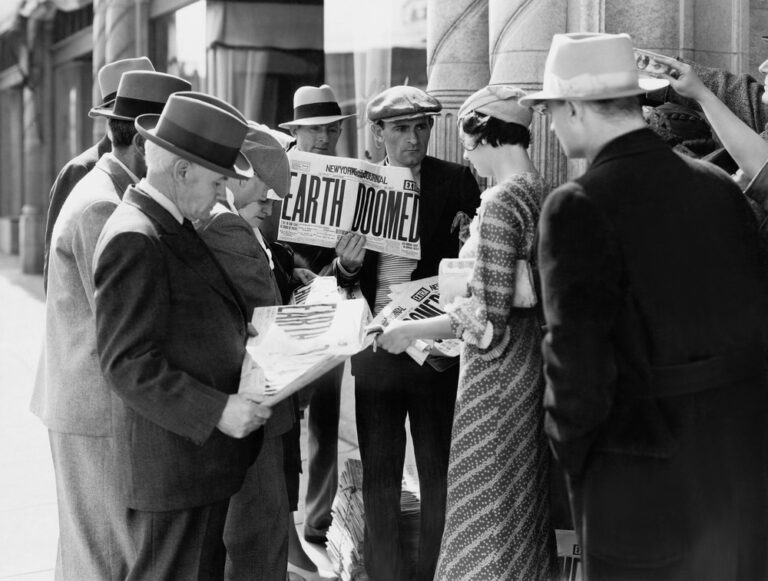Warning: this post, like my previous post on the subject, will involve a discussion of plot points and spoilers from the Dune series. If you haven’t seen the movies or read the books and want to avoid spoilers, feel free to skip this one.
I recently discussed what I remember about Paul Atreides’ character arc in the books Dune And Messiah of the dunes. I see it as a story about how absolute power becomes no less dangerous when wielded by a good person. As I said in this article, if there was ever anyone who could have been trusted to wield absolute power and use it wisely, it would have to have been Paul Atreides. However, his reign causes havoc. This raises another interesting question: why was Paul’s reign so much more devastating than previous regimes?
At first glance, this may seem confusing. And it’s not something that’s explicitly explained in the books. But I think there is a consistent in-universe answer to this question. This requires understanding the world constructed by Frank Herbert.

The world of Dune describes a civilization with a very complex and sophisticated political system. A good summary of how this system was implemented can be found in This video, but a few quick points can be made here. First, in the world of Dune, the Emperor was not all-powerful. The Imperial Household was part of a large and complex system of organizations that were all both in tension with each other and also dependent on each other to one degree or another. In other words, it was a system of checks and balances, with dispersed power.
While Imperial House Corrino was by far the most powerful individual House, there were a number of other Great Houses making up an organization called Landsraad. The Great Houses of the Landsraad included House Atreides and House Harkonnen, as well as many other Great Houses. The combined military strength of all the Great Houses of the Landsraad would be sufficient to challenge House Corrino and their fearsome Sardaukar army – but it would require a truly unified effort to achieve this, and it would come at a great cost. This served as a check on the Emperor, with the Landsraad ensuring that each Great House was protected from the possibility of the Emperor eliminating them one by one. Any attempt by the Emperor to do so would provide the Great Houses with the motivation to rise up against him in unity.
Another important player was the Spacing Guild, which held complete control over all interstellar travel. Without a guild navigator to find safe paths, interstellar travel would be virtually impossible. Houses that become too ambitious or aggressive, or that clash with the Space Guild, may find themselves suddenly isolated, unable to travel or trade. Even the Emperor could not afford to cross them. But at the same time, the Spacing Guild also needed clients to survive, providing another system of controls and mutual dependence.
There was also CHOAM, which was essentially a giant corporation that oversaw all economic activities. The Great Houses and the Imperial House, as well as powerful political actors, all owned shares of CHOAM to varying degrees and, as shareholders, all had some degree of voting and influence within CHOAM , but none of them could fully control her. The Imperial House owned 25% of CHOAM’s shares – a significant share, but without control, and securing any economic changes the Imperial House might desire would require the cooperation and agreement of a wide range of supporters.
Finally, there is the Brotherhood of the Bene Gesserit, a quasi-religious organization that often operates clandestinely to direct its activities toward its own ends. Their behind-the-scenes manipulations included a breeding program in which they selectively combined bloodlines over thousands of years in an effort to bring about a superb. Paul Atreides gains his powers through this program, although the Bene Gesserit is unable to control Paul. because he was born a generation earlier than expected.
At the beginning of Dune, this system has existed in a stable equilibrium for thousands of years. It’s not exactly one’s idea of a political paradise, but it is at least stable. However, when Paul Atreides ascends the imperial throne at the end of the first book, this dispersed system of power with its various checks and balances is shattered. The Bene Gesserit order was seriously weakened. Paul Atreides managed to bring the Space Guild into line under the threat of the destruction of spice production (spices being necessary for the Guild’s navigators to chart a safe passage through space). The shares of CHOAM held by the Great Houses that were destroyed during the Fremen assault on the galaxy were taken over by the new Imperial House Atreides, leading to the Imperial House owning 51% of the shares and creating the first time a single entity had controlling control. number of shares. And the devastation caused by the conflicts after Paul’s resurrection greatly weakened the strength of the Landsraad, also reducing them as a brake.
As a result of all this, Paul Atreides replacing the former Emperor Shaddam was not simply replacing one ruling monarch with another. If that had been the only change, things might have gone better. All the advantages Paul had – his sense of justice, his Mentat mental abilities, his prescient vision of the future – could very well have led to better results. But it was not simply a matter of replacing one leader with another. The system of checks and balances and dispersed power that existed before has become a system of concentrated power lacking real controls. And this, I believe, is why Paul’s seemingly superior qualities as a leader still failed to prevent the devastation.
In the history of Dune, morally compromised people holding dispersed power and serving as checks against each other prove to be better and more stable than a system of absolute and concentrated power led by a morally strong, superhumanly intelligent and far-sighted leader. Tyranny cannot be avoided by ensuring that sufficiently well-meaning, intelligent, and noble people are in power. The only effective way to combat tyranny is to ensure that no single organization or institution has controlling power over civilization. And this lesson is just as true in the real world as it is in the story of Dune.


